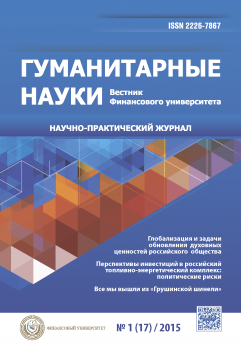The article deals with the problem of innovation and technological potential of the Russian economy and its influence on the global economic crisis. Industrial policy of the state as part of the overall economic policy is one of the most widely discussed problems. Relevant legislation has been introduced. Supporters of a liberal approach to industrial policy believe that today in industrial policy following solitary branch principle is inexpedient, as in rapidly changing economic and technological conditions the ability of organizations and the state to adapt to the constantly changing environment and the introduction of new technologies comes to the fore. It is noted that the realities of the early 21st century are such that Russia has lost the ability to engineering as to the creation of new types of products on a number of branches (most). Today State industrial policy should be formed as a national, when not only the state and business, but also scientific and public organizations, civil society institutions are equal participants in its design and implementation. The principles of diagnosis of industrial policy are proposed. The reasons of the destruction of morality of the Russian economy and the loss of stability and economic development are disclosed. Concern is expressed that eight good years have bred a wealthier generation of politicians and senior managers accustomed to «manage the growing prosperity» under greenhouse conditions, when all markets are growing, when there is no competition with stronger rivals from abroad and no need in large investments into new technologies, when people are not interested in politics. Such elites have no experience of crisis management and no necessary skills, they are not charged for constant hard struggle. In Russia, a new economic strategy requires creation of intelligent and moral economy. The crisis is most striking for immoral economies, because it is the immoral conduct of business, government and citizens that actually generates crises. The current crisis is a new stage of economic and moral recovery for many countries. The paper States that the current situation in Russia does not allow to create an innovative economy nor to 2020 nor to 2050.
business, crisis, government, industry, innovation, management, modernization programs, morality, Russia, safety, service.
Промышленная политика государства как часть общей экономической политики является одной из наиболее широко обсуждаемых и одновременно одной из наиболее спорных концепций в экономической литературе. В экономической литературе исследованиям по промышленной политике уделялось и уделяется явно недостаточное внимание. Призывы некоторых аналитиков к активной промышленной политике в первой половине 1990-х гг. воспринимались как призыв к реанимации системы централизованного планирования.
В 1970–1990-х гг. промышленная политика большинства развитых стран мира была направлена на энергоресурсосбережение, освоение наукоемких технологий и «облегчение» отраслевых структур путем передачи трудоресурсоемких и экологически сложных производств в менее развитые страны. Примерами такой политики во второй половине XX в. выступали политики Франции, Швеции, Южной Кореи, Индии, Японии и многих других стран. Таким образом, активная промышленная политика в большинстве развитых стран имеет следствием изменение отраслевой структуры экономики.
1. Mau V. Dogonyayushchaya modernizatsiya v sovremennoy Rossii [Catch-up modernization in contemporary Russia]. Problemy teorii i praktiki upravleniya [Problems of the theory and practice of management]. 2004, I. 4, pp. 13-16.
2. Blinov A.O. Formirovanie imidzha Rossii kak instrument upravleniya ee razvitiem [Formation of image of Russia as a tool for managing its development]. 2013, I. , pp. 28-34.
3. Blinov A.O., Yanovskiy V.V. Rossiyskiy ekonomicheskiy krizis: nravstvennyy aspect [The Russian economic crisis: the moral aspect]. Upravlencheskoe konsul’tirovanie [Management Consulting]. 2013, I. 3 (51), pp. 43-50.
4. Blinov A.O., Ugryumova N.V. Upravlenie izmeneniyami [Management of changes]. Moskow,Dashkov and Co Publ., 2014. 304 p.
5. Amabile T.M. Social psychology of creativity: a consensual assessment technique // Pers. &Soc/ Psychol. 2003. V. 43.
6. Gius A. Zhivaya kompaniya. Rost, nauchenie i dolgozhitel’stvo v delovoy srede [Growth, learning and longevity in the business environment]. St. Petersburg, The Stockholm School of Economics in St. Petersburg Publ., 2004. 221 p.
7. Eskindarov M.A. Korporatsiya kak odna iz form adaptatsii rossiyskikh predpriyatiy k rynku [The corporation as a form of adaptation of Russian companies to the market]. Resursnyy potentsial ekonomicheskogo rosta [Resource potential of economic growth]. Moscow, The Way of Russia Publ., 2003, pp. 16-25.
8. Ansoff I. Novaya korporativnaya strategiya [The new corporate strategy]. St. Petersburg, Peter Com Publ., 1999. 416 pp.





